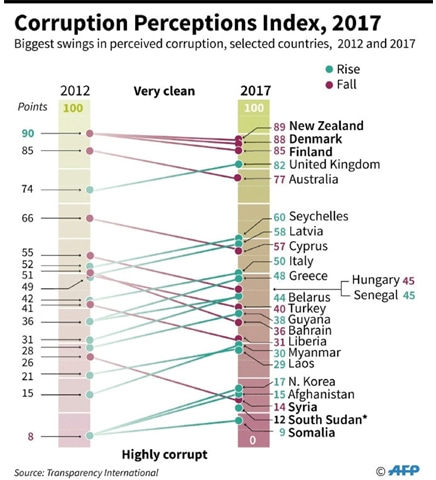
ISLAMABAD: The Corruption Perceptions Index 2017, released by the Transparency International, has placed Pakistan at the rank of 117 out of 180 countries, with no major change from 2016 when the country was ranked 116 out of 176 countries.
Pakistan’s score is 32 in 2017, showing no change from the previous year when the score was 32. The index ranks countries and territories by their perceived levels of public sector corruption according to experts and business people and uses a scale of zero to 100, where zero is highly corrupt and 100 is very clean.
The index released on Wednesday by the Transparency International reveals some disturbing information — despite attempts to combat corruption around the world, most countries are moving too slowly in their efforts.
While stemming the tide against corruption takes time, during the last six years many countries have made little to no progress. Even more alarming, further analysis of the index results indicates that countries with the lowest protections for the press and NGOs also tend to have the worst rates of corruption.
This year, the index found that more than two-thirds of countries score below 50, with an average score of 43. Unfortunately, compared to recent years, this poor performance is nothing new, the Transparency International says.
This year New Zealand and Denmark rank highest with scores of 89 and 88, respectively. Syria, South Sudan and Somalia rank lowest with scores of 14, 12 and 9, respectively. The best performing region is Western Europe with an average score of 66. The worst performing regions are Sub-Saharan Africa (average score 32) and Eastern Europe and Central Asia (average score 34).
Further analysis shows journalists and activists in corrupt countries are risking their lives every day in an effort to speak out.
An analysis of the index results by the Transparency International examined the relationship between corruption levels, protection of journalistic freedoms and engagement of civil society. It found that almost all journalists killed since 2012 lost their lives in corrupt countries.
“No activist or reporter should have to fear for their lives when speaking out against corruption,” said Patricia Moreira, managing director of the Transparency International, the global coalition against corruption. “Given current crackdowns on both civil society and the media worldwide, we need to do more to protect those who speak up.”
The analysis, which incorporates data from the Committee to Protect Journalists, shows that during the last six years, more than nine out of 10 journalists were killed in countries that score 45 or less on the Corruption Perceptions Index. This means that, on average, every week at least one journalist is killed in a country that is highly corrupt.
Since 2012, several countries significantly improved their index score, including Côte d’Ivoire, Senegal and the United Kingdom, while many other countries declined, including Syria, Yemen and Australia.
The Transparency International called upon governments and businesses to do more to encourage free speech, independent media, political dissent and an open and engaged civil society.
According to it, governments should minimise regulations on the media, including traditional and new media, and ensure that journalists can work without fear of repression or violence. In addition, international donors should consider press freedom relevant to development aid or access to international organisations.
Published in Dawn, February 23rd, 2018













































